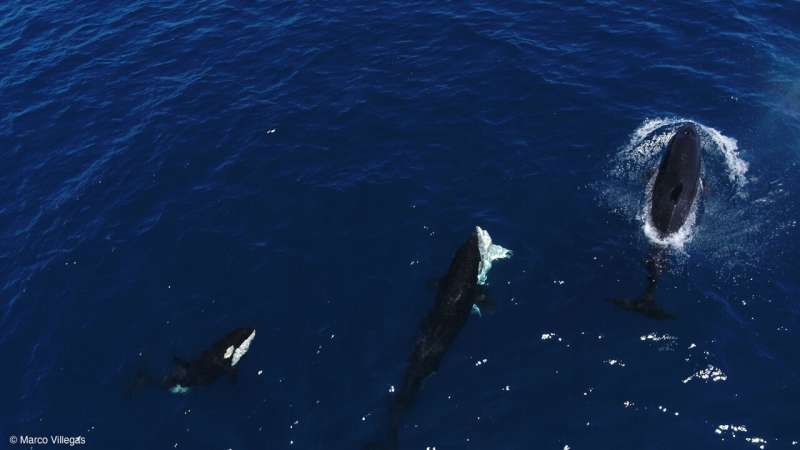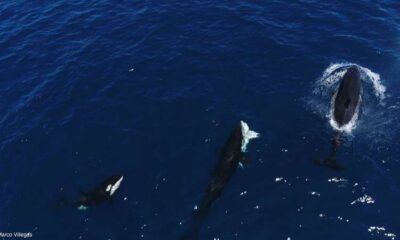Science
Orcas Target Young Great White Sharks in Gulf of California

A specialized pod of orcas in the Gulf of California has been observed hunting young great white sharks, employing a unique strategy that involves flipping the sharks upside-down to access their nutrient-rich livers. This behavior highlights the sophisticated hunting techniques of orcas and raises questions about their interaction with shark populations in the region.
The orcas, referred to as **Moctezuma’s pod**, were documented during routine monitoring efforts by marine biologists. They successfully executed two hunts that resulted in the deaths of three juvenile great white sharks. Notably, these hunts occurred in August 2020 and August 2022, with researchers capturing the events on camera and identifying individual orcas through distinct features on their dorsal fins.
Hunting Techniques and Predator-Prey Dynamics
During the first hunt, five orcas worked together to pursue a juvenile white shark, ultimately turning it upside-down. This maneuver induced a state known as tonic immobility, which temporarily incapacitates the shark, allowing the orcas to extract its liver. This process was repeated with a second shark shortly after. According to **Erick Higuera Rivas**, a marine biologist and lead author of the study published in *Frontiers in Marine Science*, this behavior illustrates the advanced intelligence and strategic thinking of orcas.
“Orcas that consume elasmobranchs, including sharks and rays, can target great white sharks when they encounter them,” Higuera explained. “The hunting techniques are passed down through generations within their pods, showcasing their sophisticated social learning.”
The second documented hunt followed a similar pattern, as five orcas flipped another juvenile shark onto its back, exposing its gills and liver. The researchers noted the shark’s blood, indicating it was severely injured during the encounter. This technique of turning sharks upside-down appears to be an effective strategy, particularly for younger, less experienced individuals, who may not respond as swiftly as adult sharks.
Environmental Changes and Future Research
The sightings of orcas preying on juvenile white sharks may be linked to environmental changes affecting shark distribution in the Pacific. Climate phenomena, such as **El Niño**, have altered the nursery areas of white sharks, potentially increasing their presence in the Gulf of California. As these changes occur, Moctezuma’s pod could find new opportunities to hunt juvenile sharks, making them vulnerable targets during specific seasonal periods.
“Adult white sharks tend to vacate their seasonal gathering areas in response to orca threats, returning only after months,” said **Dr. Salvador Jorgensen**, a researcher at California State University and co-author of the study. “Juvenile white sharks, however, may be naïve to orca hunting strategies, which raises questions about whether their evasive responses are instinctual or learned.”
The scientists plan to conduct a more extensive dietary survey of Moctezuma’s pod to determine if they regularly hunt white sharks or primarily target them when they are accessible. Conducting this research presents challenges, as fieldwork can be costly and orca hunts are inherently unpredictable.
“We have observed this pod primarily feeding on elasmobranchs so far,” said **Dr. Francesca Pancaldi** from the Instituto Politécnico Nacional Centro Interdisciplinario de Ciencias Marinas. “There may be more to discover. Understanding the feeding behavior of killer whales in this region will help us identify critical habitats, allowing for the creation of protected areas and management plans to reduce human impact.”
The findings underscore the complex dynamics of predator-prey relationships in marine ecosystems. As scientists continue to study these interactions, they hope to gain insights into the behavior of orcas and their potential impact on great white shark populations.
-

 Technology4 months ago
Technology4 months agoDiscover the Top 10 Calorie Counting Apps of 2025
-

 Health2 months ago
Health2 months agoBella Hadid Shares Health Update After Treatment for Lyme Disease
-

 Health3 months ago
Health3 months agoErin Bates Shares Recovery Update Following Sepsis Complications
-

 Technology3 weeks ago
Technology3 weeks agoDiscover 2025’s Top GPUs for Exceptional 4K Gaming Performance
-

 Technology2 months ago
Technology2 months agoElectric Moto Influencer Surronster Arrested in Tijuana
-

 Technology4 months ago
Technology4 months agoDiscover How to Reverse Image Search Using ChatGPT Effortlessly
-

 Technology4 months ago
Technology4 months agoMeta Initiates $60B AI Data Center Expansion, Starting in Ohio
-

 Technology4 months ago
Technology4 months agoRecovering a Suspended TikTok Account: A Step-by-Step Guide
-

 Health4 months ago
Health4 months agoTested: Rab Firewall Mountain Jacket Survives Harsh Conditions
-

 Lifestyle4 months ago
Lifestyle4 months agoBelton Family Reunites After Daughter Survives Hill Country Floods
-

 Technology3 months ago
Technology3 months agoUncovering the Top Five Most Challenging Motorcycles to Ride
-

 Technology4 weeks ago
Technology4 weeks agoDiscover the Best Wireless Earbuds for Every Lifestyle













